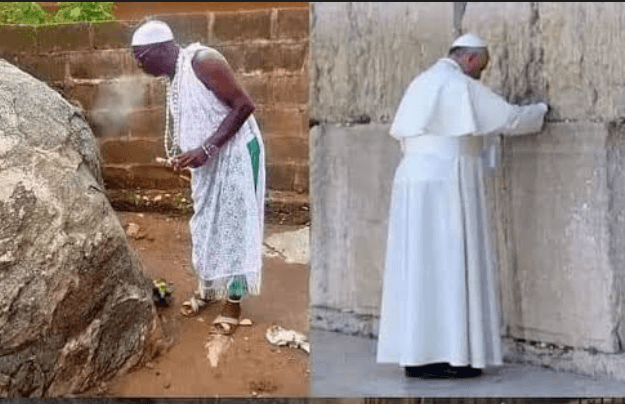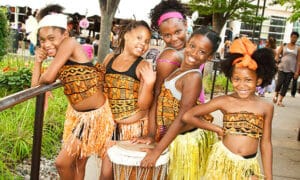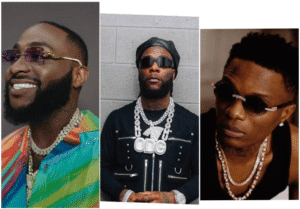Traditional Religion and western Religion seems there is growing tension between traditional religion and Western religion. This tension has sparked numerous debates, both online and offline. These debates continue to raise important questions among the younger generation regarding which path is superior or more worthy of adherence. In this piece, we shall discuss these discrepancies and examine their implications, while contributing meaningfully to the larger discourse.
We’re going to dive into this discourse by exploring key thematic principles on the topic. The word tradition means different things to different people. For some, it’s about how we dress, greet our elders, or celebrate weddings. For others, it’s about gods, ancestors, and sacred rituals passed down through generations. Many young people in Africa — especially in Nigeria — ask the same question: Is tradition the same as traditional religion? And how does Christianity fit into all this?
To answer that, we must understand where each one comes from, how they differ, what they have in common, and why there’s often tension between them.
Let’s explore.
Traditions
Tradition simply means the things we do because our parents, grandparents, and ancestors did them. These can include how we cook certain meals, how we greet older people, and how we celebrate important events.
For example, in Yoruba culture, it’s common for younger people to kneel or prostrate to greet elders. In Igbo land, traditional marriage ceremonies are colorful and involve the bride’s family welcoming the groom with kola nuts and palm wine. In the North, Hausa traditions may involve praise singing and drumming during naming ceremonies.
These customs are part of what makes a people unique. They create identity. They also bring communities together.
Importantly, not all traditions are religious. Many are simply cultural — passed down to keep a people’s way of life alive.
Traditional Religion
Traditional religion is different. Traditional Religion is a spiritual belief system that is/was in existence before the emergence western Religion (Islam, Christianity etc.) It is a belief system that our ancestors followed to connect with the spiritual world.
Before Christianity and Islam came to Africa, most ethnic groups had their own ways of worship. They believed in one supreme God — but also worshipped lesser spirits, ancestors, and deities.
For example:
- The Yoruba people worship Olodumare as the supreme being, but also honor Orishas like Sango (god of thunder) and Ogun (god of iron). This is part of the Ifá religion.
- The Igbo believe in Chukwu (the supreme God), but also have local deities like Amadioha (god of justice) and Ala (goddess of the earth). Their belief system is called Odinani.
- Among the Urhobo and Bini people, ancestral worship and respect for spirits is common.
These religions involve rituals, sacrifices, divination, and spiritual festivals. Traditional priests or priestesses often serve as messengers between humans and the spirit world.
Unlike Christianity, these systems don’t usually have written scriptures. Knowledge is passed orally from elders and spiritual leaders.
According to Encyclopedia Britannica, African traditional religions are deeply tied to the land, ancestors, and natural elements.
Christianity
Christianity came to Nigeria through missionaries in the 15th and 19th centuries, especially from Europe. The religion grew stronger during colonization when the British introduced schools, churches, and hospitals — often managed by missionaries.
Christianity teaches that there is one God, and Jesus Christ is His son. Christians believe in the Bible, pray, and go to church. Many also celebrate Easter, Christmas, and other holy days.
When Christianity arrived, it saw traditional religion as “pagan” or “idol worship.” Missionaries tried to stop many traditional practices — including rituals, songs, and festivals — calling them evil.
Because of this, many Africans left their traditional religions and converted to Christianity. Others mixed both systems in secret. This mix is called syncretism.
For example, in some villages, people go to church on Sunday but still consult a traditional healer when they’re sick. Others attend Christian weddings but also follow traditional marriage rites.
Key Differences
Let’s break down the key differences — in plain words.
- Tradition is about culture. It includes food, language, greetings, and family customs.
- Traditional religion is about spirituality. It deals with gods, ancestors, and worship.
- Christianity is a global religion that follows the teachings of Jesus Christ.
Tradition is broad. Religion is just one part of it.
You can wear traditional clothes, speak your language, and greet elders the traditional way — even if you are a Christian or Muslim.
Traditional religion and Christianity both involve worship and beliefs about life and death. But they approach it differently. Christianity has one path to salvation — Jesus Christ. Traditional religions often involve different gods and spiritual forces, depending on the community.
Origins
Traditional religion was born on African soil. It came from the beliefs of our ancestors. It is local, rooted in the land and history of each ethnic group.
Christianity started in the Middle East over 2,000 years ago. It spread through missionaries, trade, and colonization.
Tradition, on the other hand, has no one origin. It grows over time as people live, learn, and adapt.
What All Religions Have in Common
When we look closely, we realize something important: every religion — whether it’s traditional African religion, Christianity, Islam, Buddhism, Hinduism, or Judaism — involves belief, spirituality, and connection to something higher than us.
Each one:
- Believes in a divine power or spiritual force (God, gods, ancestors, or universal energy).
- Has sacred teachings or oral traditions that guide behavior.
- Involves rituals — like prayer, fasting, singing, or meditation.
- Teaches values like kindness, honesty, and respect.
- Reflects the culture and traditions of the people who follow it.
Even the most modern religious practices are shaped by ancient traditions. For example:
- In Christianity, we still take Holy Communion — a practice with deep symbolic roots.
- Muslims observe Ramadan, rooted in centuries of tradition from the Prophet Muhammad’s time.
- In Buddhism, monks chant and meditate — practices passed down for over 2,500 years.
- In traditional African religions, pouring libation, drumming, and ancestral veneration continue today in both rural and urban areas.
- Both believe in a higher power. Both teach morals, to be kind, respectful, and honest. Both use prayer, songs, and rituals. Both value community and family.In fact, many Christian churches in Nigeria now include drumming, dancing, and native languages in their services — elements taken from tradition.
So while our paths may be different, the foundation is often the same: a search for meaning, connection, and something greater than ourselves.
No religion is empty. None is without tradition. And none should be mocked or ignored — because they all speak to the human spirit in different ways.
Is There a Superior or Best?
This is a sensitive question. But the truth is, no belief system is automatically better than another. It depends on what speaks to your heart.
Some people feel close to God through the Bible. Others feel connected through their ancestors and local deities. Some believe in both.
Problems arise when one group tries to force their beliefs on others. Religion should never be a weapon.
Respect is key. Whether you are Christian, Muslim, or a follower of traditional religion — we all deserve to be understood and respected.
Segregation: Why the Divide Exists
There’s often tension between Christians and those who follow traditional religions. But why?
Colonization played a big role. When European powers came, they made their religion the “right one.” They destroyed shrines, banned rituals, and punished traditional priests.
Schools taught that African beliefs were backward or demonic. The result? Many people grew up ashamed of their culture.
Today, some still believe that wearing beads or visiting a shrine is evil — even if it’s part of their culture.
Others fear being rejected by their church or community if they explore their roots. This fear creates division.
We All Seek a Higher Power
At the heart of every religion — and even beyond religion — is this human truth:
Everyone believes in something greater than themselves.
Whether we call it God, Allah, Chukwu, Amadioha, Olodumare, Buddha, the universe, or even “the ancestors,” we all have moments when we look up and whisper a prayer.
It may be in silence. It may be with tears.
But deep down, we all reach out to something we believe is listening.
That superior being is not just seen as powerful — but as personal.
We believe this being can:
- Hear what no one else hears,
- Understand what we can’t explain,
- And provide help when everyone else fails.
This is why people pray during sickness.
Why people make promises in secret.
Why even those who say they don’t “go to church” still talk to the sky when they’re in pain.
Across the world, across all religions — and even outside formal religion — humans believe in a higher power that watches over them, understands their hearts, and has more power than any human.
That belief brings hope.
And in many ways, it brings us all closer than we think.
Why Understanding Matters
Knowing the difference between tradition and religion helps us build a stronger identity.
You can love your culture without worshiping idols. You can be a proud Nigerian and a proud Christian.
When we understand each other, we stop judging. We also begin to ask deeper questions: Why do I believe what I believe? What did my ancestors believe? What parts of tradition can I still carry with pride?
Culture is not the enemy of faith. They can work together — if we allow space for both.
Conclusion
Tradition, traditional religion, and Christianity are not the same — but they all play a role in shaping who we are.
Tradition is our way of life. Traditional religion is how some of our ancestors connected with the divine. Christianity is a faith embraced by millions today.
Rather than fight over which is right, let’s learn, ask questions, and show respect. After all, understanding our past helps us build a better future.
So, what does tradition mean to you today?




